Preview of the Olympic road race 2024 - Men | Van der Poel begins a tough mission for gold
CyclingMonday, 29 July 2024 at 11:33
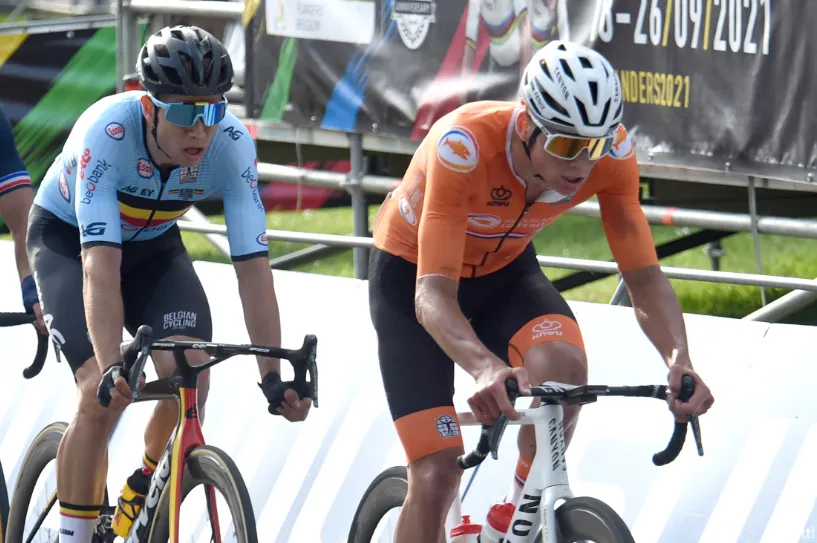
On the second Saturday of the 2024 Olympic Games, the event that many Dutch cycling enthusiasts (and by extension all sports fans) are eagerly anticipating is on the schedule: the men's road race, with world champion Mathieu van der Poel as a contender for the gold. IDLProCycling.com attempts to outline what can be expected.
Cycling and the Olympic Games have a long-standing relationship. However, it wasn't until 1996 that professional cyclists began participating in the world's largest sporting event. The late Fabio Casartelli was still an amateur when he won at the Barcelona Games in 1992.
After that, it was Swiss cyclist Pascal Richard who triumphed in Atlanta in 1996. Jan Ullrich claimed victory in Sydney (2000), followed by Paolo Bettini (2004, Athens), Samuel Sánchez (2008, Beijing), the controversial Alexandre Vinokourov (2012, London), golden Greg Van Avermaet (2016, Rio de Janeiro), and finally Richard Carapaz (2021, Tokyo).
One thing is certain: a new name will be added to this list. Carapaz was not selected by the Ecuadorian federation, and the other men have since retired. All to play for in Paris!
Practical information Olympic road race 2024 men
- Saturday, August 3, 2024
- Participants
- Classification: Olympics
In this article
- Latest winners
- Course, weather and times
- Favorites
- TV information
Latest winners Olympic road race men
2020 Richard Carapaz
2016 Greg Van Avermaet
2012 Alexandre Vinokourov
2008 Samuel Sanchez
2004 Paolo Bettini
2000 Jan Ullrich
1996 Pascal Richard
1992 Fabio Casartelli
1988 Olaf Ludwig
1984 Alexi Grewal
2016 Greg Van Avermaet
2012 Alexandre Vinokourov
2008 Samuel Sanchez
2004 Paolo Bettini
2000 Jan Ullrich
1996 Pascal Richard
1992 Fabio Casartelli
1988 Olaf Ludwig
1984 Alexi Grewal
Course, weather and times Olympic road race 2024 men
Experts are mostly in agreement. The course in Paris is one for the classic types, the men who usually shine in the spring races. In the French capital, a route has been mapped out that centers around Montmartre, a cobblestone climb one kilometer long with an average gradient of 6.5 percent.
However, there's a lot of ground to cover before reaching that loop. In October, IDLProCycling.com went to Paris for an in-depth analysis of the 273-kilometer course with approximately 2800 meters of elevation gain, which will kick off at Trocadero. Located near the Eiffel Tower, expect not only potentially interesting attacks but also plenty of scenic, tourist-friendly images.
After the start, the race heads southwest via the Côte des Gardes (1.9 km at 6%) towards the Palace of Versailles, one of France's many tourist attractions. The course also passes by the Château of Saint-Germain-en-Laye, where a one-kilometer climb at 5.5 percent must be overcome. In the valley around the Mauldre, the race may calm down a bit, provided it doesn't become too tactical.
Read more below the photo.
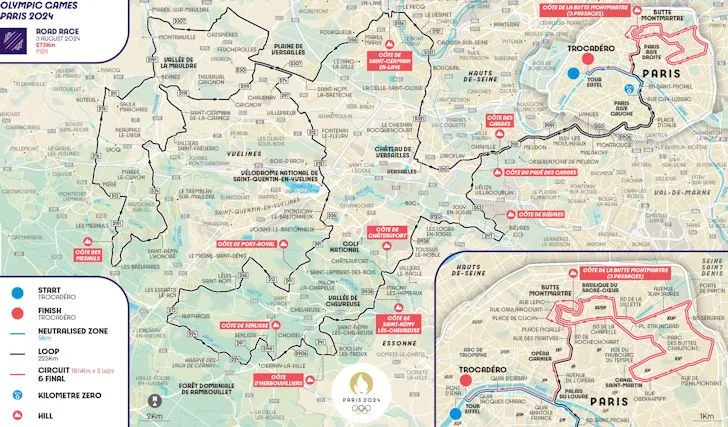
The turning point is around the Côte des Mesnuls (1.1 km at 6.1%), after which we head towards the tougher pre-finale through the track cycling domain in Saint-Quentin-en-Yvelines. The Côte de Senlisse (1.3 km at 5.3%), Côte des Herbouvilliers (0.8 km at 5.7%), Côte de Saint-Rémy-lès-Chevreuse (1.3 km at 6.3%), and Côte de Chateaufort (0.9 km at 5.7%) follow each other in quick succession, then via the Côte de Bièvres (1.2 km at 6.5%) and Côte des Gardes (1.3 km at 6.5%) we arrive back in Paris. This gives it much of the character of a classic Flemish race!
Once back in Paris, the riders will pass landmarks such as the Louvre before reaching the local circuit of 18.4 kilometers. Shortly thereafter comes the first climb of Montmartre, where the riders will, of course, pass the world-famous Sacré-Cœur on a gentle descent. Montmartre itself is one kilometer long at an average gradient of 6.5%, with the steepest section, just over ten percent, approximately halfway up.
The climb, which largely follows the Rue Lepic, is covered with large cobblestones. This makes it very difficult to ride smoothly and is thus advantageous for the classic riders. Cyclists such as Mathieu van der Poel and Wout van Aert have already expressed their enthusiasm for the Olympic route following its announcement.
Read more below the photo.
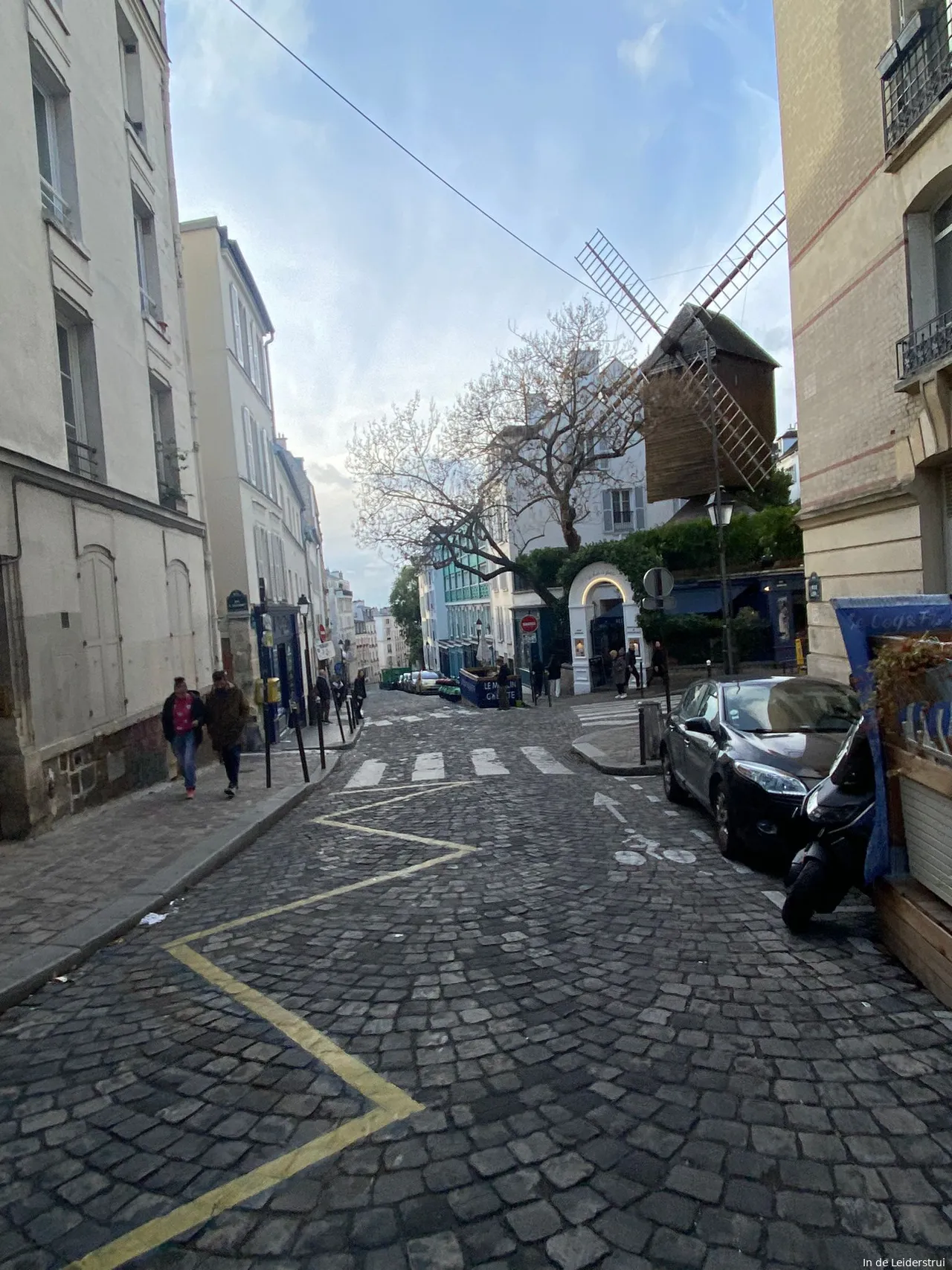
Once Montmartre is rounded, the route goes along the fairly wide Boulevard de la Villette and Avenue Jean Jaurès towards the Périphérique, the well-known ring road around Paris. At Porte de Pantin, however, the riders turn onto Boulevard Sérurier, where the road begins to climb again. They then travel via several broader roads past Parc des Buttes-Chaumont, before heading back towards Montmartre from the wider Boulevard de la Chapelle.
After passing the Sacré-Cœur for the final time, the riders take an immediate left turn and, after ten flat kilometers, arrive at the Eiffel Tower. All in all, it is a course where classic riders can excel and one that television viewers can enjoy from start to finish!
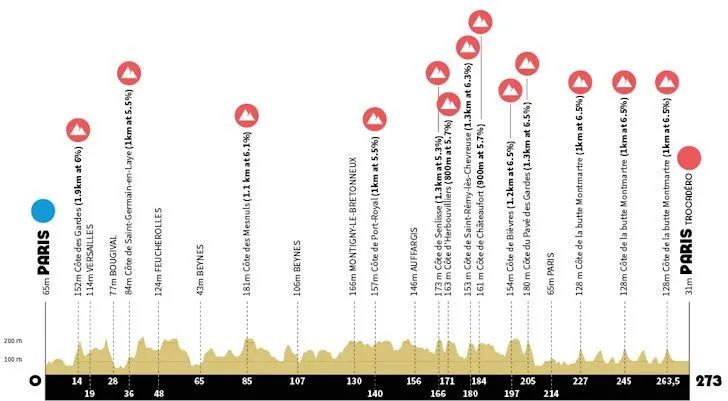
Weather
The conditions in Paris on Saturday will not be an issue. Temperatures are expected to be around 27 degrees Celsius in the French capital, with virtually no chance of rain and a light wind blowing from the southwest.
The conditions in Paris on Saturday will not be an issue. Temperatures are expected to be around 27 degrees Celsius in the French capital, with virtually no chance of rain and a light wind blowing from the southwest.
Times
Start: 11 a.m.
Finish: Approximately 6:15 p.m.
Start: 11 a.m.
Finish: Approximately 6:15 p.m.
Favorites Olympic road race 2024 men
If there's one race worth watching this year, it's this Olympic road race. The situation is quite unusual due to the reduction in the number of participants. In Tokyo, there were 130 riders, but now there are only 90. All countries have fewer riders, which will undoubtedly impact the race dynamics in this 273-kilometer event.
The bookmakers have identified one name as the absolute top favorite: Mathieu van der Poel. The Dutchman has two compatriots by his side, with Dylan van Baarle as a co-leader and super-domestique, and Daan Hoole as a helper. "With a clear focus and a solid route towards the Games, we aim for success again with this team. The course leads the riders through the streets of Paris, and the climbs around Montmartre in particular offer opportunities," explained national coach Koos Moerenhout.
Read more below the photo.
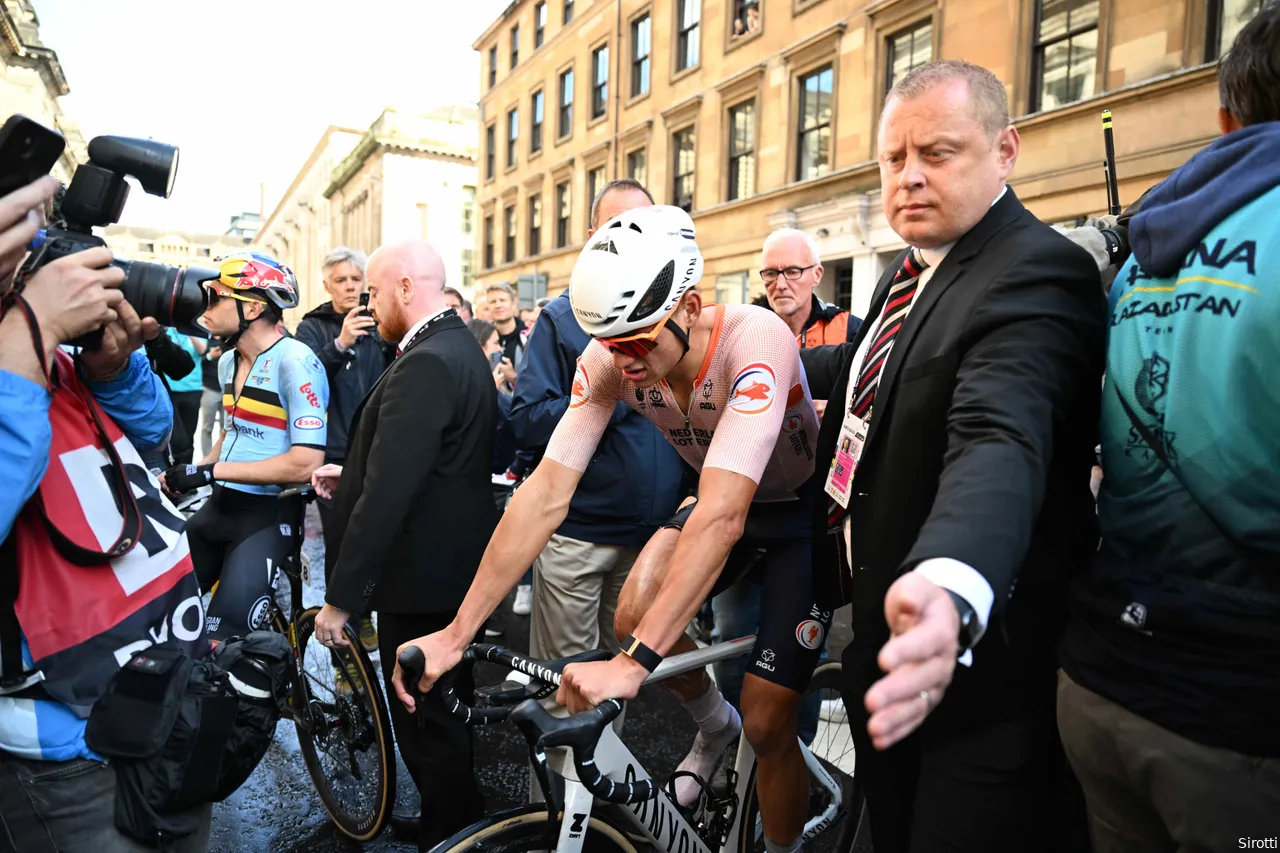
"It is quite an open course, with many contenders. It's a small peloton of small teams, but still 275 kilometers long," said Moerenhout to this site. "A lot can happen, which is why we also chose to include Hoole to help control the race. It’s possible that after ten kilometers, ten riders could break away, with strong nations among them. And who will chase then?"
A difficult question, but it is certain that some countries will indeed adopt that tactic. In this regard, Belgium might be in the most luxurious position. National coach Sven Vanthourenhout has Remco Evenepoel, Wout van Aert, Jasper Stuyven, and Tiesj Benoot—four men who can stay strong deep into the finale. But what if Evenepoel makes it an early race, as he did at the 2022 World Championships in Wollongong, which he won?
This would put Van Aert and Stuyven in a position where they can sit in the wheels and save their energy for the final climb of Montmartre, where they should be able to go up with the best. These are, of course, all hypotheses, and we will have to wait and see how our southern neighbors plan to approach it, but it is possible that they could be decisive in shaping the race dynamics of this Olympic road race.
Read more below the photo.
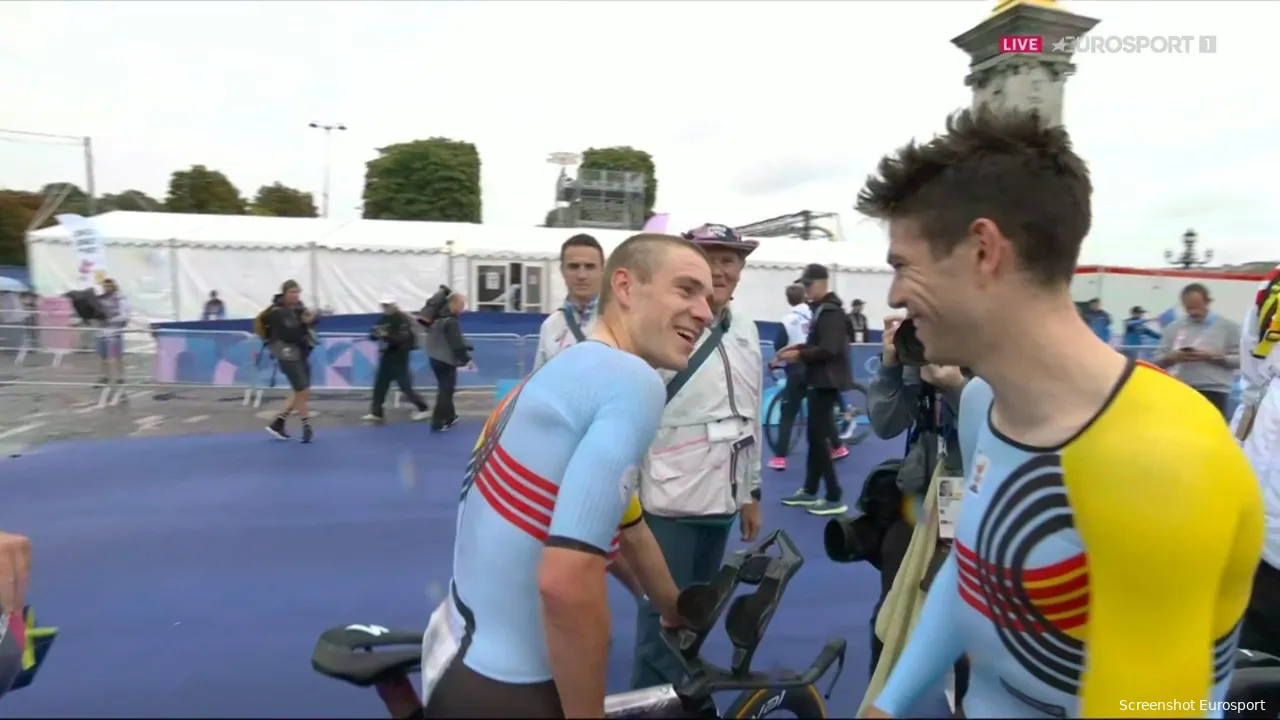
Belgium has one more rider than the Netherlands, which is also true for Slovenia, France, Denmark, and Great Britain. Two of those countries are facing some issues: the Slovenians saw their leader Tadej Pogacar drop out, while the Danish captain Mads Pedersen sustained a shoulder blade fracture during the Tour. He is making his return on Saturday, but his exact form is uncertain. This is significant, as Pogacar and Pedersen finished third and fourth at last year's World Championships in Glasgow. That race was highly representative of what we can expect in Paris.
Then there are the French and the British, who each field strong teams. The French are mainly relying on Julian Alaphilippe and Christophe Laporte, who have both stayed somewhat under the radar in the lead-up to this Olympic road race. As a two-time world champion and the reigning European champion, it’s hard to truly fly under the radar, so expect them to follow a plan devised by national coach Thomas Voeckler.
Great Britain has Joshua Tarling and Tom Pidcock, two of the world's greatest cycling talents. For both, their primary goals (Tarling in the time trial, Pidcock in mountain biking) are already completed by Saturday, which might make them even more dangerous. Tarling proved this spring that he can handle the Flemish classics and is someone you absolutely shouldn't give a ten-meter lead to, while Pidcock, with his explosiveness, will also be well-prepared for this challenge.
We have already mentioned quite a few countries, but the always strong Italians and Spaniards have not yet been covered. The Italian team, in the absence of Filippo Ganna who is focusing on the track, will rely on Alberto Bettiol, a championship rider who dares to go all-in. The Tuscan experienced cramps at the previous Olympics at the last minute, and last year he was overtaken by Van der Poel in Glasgow. He is a man to watch.
Read more below the photo.
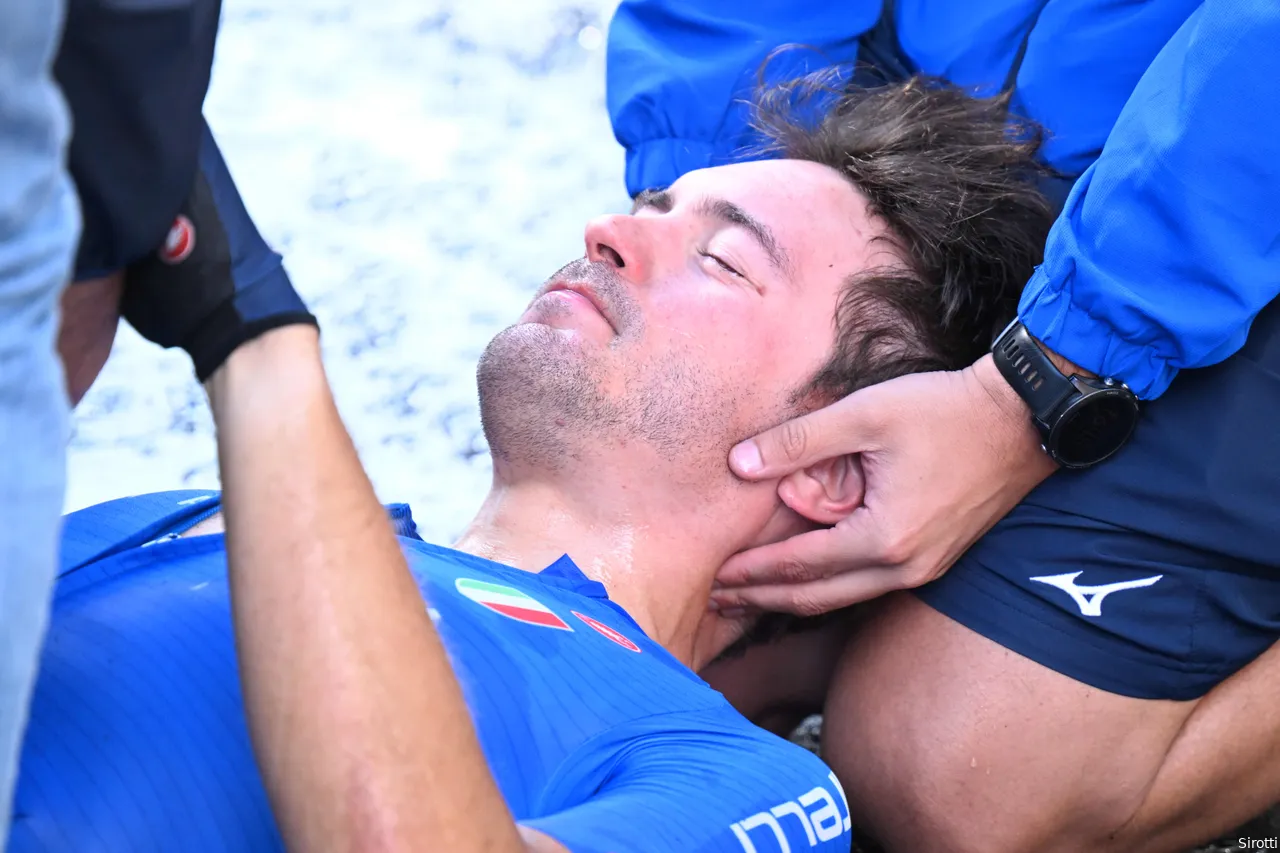
With the Spaniards, we have Oier Lazkano, Alex Aranburu, and Juan Ayuso, with the former being the most highly rated as a rider who never stops moving. However, this puts them in the group of countries with outsiders who could be valuable allies for the major nations through a long venture. The Olympics are also about this: with a silver and bronze medal, there are still prizes to be won.
Consider the Americans with Matteo Jorgenson, Brandon McNulty, and Magnus Sheffield, or the Germans (Max Schachmann and Nils Politt), Australians (Michael Matthews), Irish (Ben Healy), Colombians (Santiago Buitrago and Daniel Felipe Martínez), Slovenians (Matej Mohoric and Jan Tratnik), Canadians (Michael Woods and Derek Gee), New Zealanders (Laurence Pithie and Corbin Strong), Swiss (Stefan Küng and Marc Hirschi), and Danes (besides Pedersen, also Mattias Skjelmose and Mikkel Bjerg): they don’t have many options, so to avoid being led to the slaughter, they must also take risks.
This is especially true for the strong individuals competing in Paris. Jhonatan Narváez (Ecuador) and Biniam Girmay (Eritrea) will have to go it alone as shadow favorites, just like the hard riders such as Michal Kwiatkowski (Poland), Mathias Vacek (Czech Republic), Toms Skujins (Latvia), Alex Kirsch (Luxembourg), and Ryan Gibbons (South Africa). The latter four, as Lidl-Trek teammates of Pedersen, could also influence the race in other ways, as alliances have been formed in the past for these events.
On y va!
According to IDLProCycling.com who are the favorites for time trial Olympics 2024 men?
Top favorites: Mathieu van der Poel (Netherlands) and Remco Evenepoel (Belgium)
Outsiders:Wout van Aert, Jasper Stuyven (Belgium), Christophe Laporte (France), Jhonatan Narváez (Ecuador) and Alberto Bettiol (Italy)
Long shots: Mads Pedersen (Denmark), Dylan van Baarle (Netherlands), Biniam Girmay (Eritrea), Julian Alaphilippe (France), Michael Matthews (Australia), Maximilian Schachmann (Germany), Matteo Jorgenson (United States), Matej Mohoric (Slovenia), Marc Hirschi (Switzerland) and Joshua Tarling (Great Britain)
Outsiders:Wout van Aert, Jasper Stuyven (Belgium), Christophe Laporte (France), Jhonatan Narváez (Ecuador) and Alberto Bettiol (Italy)
Long shots: Mads Pedersen (Denmark), Dylan van Baarle (Netherlands), Biniam Girmay (Eritrea), Julian Alaphilippe (France), Michael Matthews (Australia), Maximilian Schachmann (Germany), Matteo Jorgenson (United States), Matej Mohoric (Slovenia), Marc Hirschi (Switzerland) and Joshua Tarling (Great Britain)
TV road race Olympics 2024 men
The Olympic road race will be available Saturday on the channels that provide us with footage throughout the Olympics. On the one hand, with HBO Max and Discovery+ you will have the certainty of watching the entire race, on the other hand, the NOS (NPO 1), Sporza (VRT 1) and Eurosport (1) will also come with the necessary footage in the morning and afternoon.
HBO Max | Sport takes over from Eurosport as an online streaming service for cycling fans! Subscribe now and don't miss a race mile!
IDL-productions

Pogacar responds to Soudal complaints: "Domen Novak had already set the pace for 150 km"
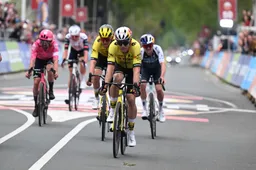
Visma | Lease a Bike dismisses Giro rumors about strong climbing van Aert as pure speculation
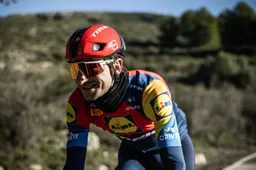
Favorites stage 2 Tour of the Alps 2025 | Lidl-Trek calls the shot: Ciccone again, or a breakaway surprise
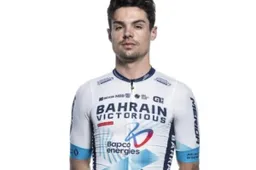
Former Ardennes star fights back with clear conscience, but doping stain lingers
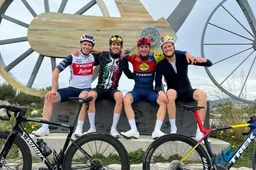
Ciccone avoids Giro talk but with help from Oomen and famous friends, he can't deny he’s in top form
Latest Cycling News
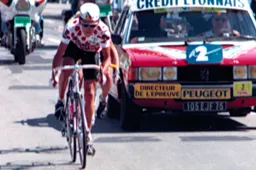
Colombian mountain king Lucho Herrera accused of organizing multiple murders

Johan Bruyneel: "We are seeing these phenomenal riders, and I have said it a few times, I think they are their own worst enemy"

Pogacar responds to Soudal complaints: "Domen Novak had already set the pace for 150 km"

Skjelmose’s emotional tribute after Amstel Gold Race victory: "You gave me strength"

A Grand Slam for van der Poel? Father Adrie is optimistic, but knows: "Organizers keep making their races tougher"
Popular Cycling News

Pogacar responds to Soudal complaints: "Domen Novak had already set the pace for 150 km"
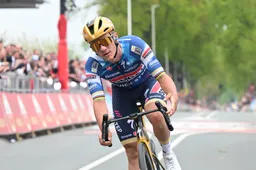
Evenepoel points to UAE rider as cause of massive crash, and warns ahead of Huy: "Nys won’t get a free ride"
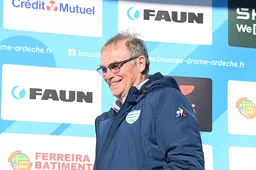
Hinault fires back at French critics over Pogačar doping suspicions: "What would they say if he were French?"
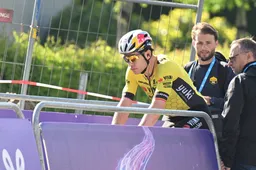
Van Aert admits mistake: "That was a misjudgment on my part"

Visma | Lease a Bike dismisses Giro rumors about strong climbing van Aert as pure speculation
Latest Comments
- Such negative comments that are truly inappropriate and actually ridiculous. He sounds like an old man, bitter that he can't race anymore. Why can't he just be gracious? Or just shut up. Instead of howling for attention, in such a rude manner. Must be Dementia creeping in. We are all living in the Now. Records are there, and some are being broken, some are unapproachable. If he doesn't like it, and it makes him sick, maybe he ought start watching some other sport. Don't want the old mans health to be upset.
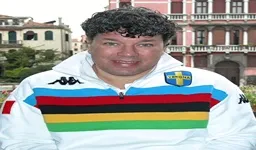 reemmo031-03-2025
reemmo031-03-2025 - Roger De Vlaeminck inspires me to create a new beer: "Bitter Old Twat Belgian".JackInhof31-03-2025
- Shoot, I'll ride it for 1/10 of what his pay for that day is😅Veganpotter30-03-2025
- What is this? The Lance Armstrong daily cheaters channel? I could care less about Johan and Lance the seven times cheater. Greg Lemond was right all along, Why don't you write about that instead of these two knuckleheads.velodrone28-03-2025
- Are we all doomed to hear from Lance Armstrong and Johan bruneel until the end of time? It's not enough the stain they left on cycling? Do we have to see that shadow forever?bigyakman26-03-2025
- I am not sure if it is the hardest to win. In Flanders and Roubaix well before the finish the Peleton will be decimated and the race will normally be won by the best rider of the day or maybe 2nd or 3rd in case of a mechanical or unlucky break especially in case of Roubaix. In San Remo just before the finish there will still be several riders in contention and they are hard to ditch. For the best riders it is a race hard to win since it is not so selective. But if you are not a top 5 rider but still a top 10 rider this race is your best change to win. You will see more Milan San remo Winners with only 1 monument win than any other monumentsJoostmehrtens19-03-2025
- "fap fap fap oh Lance oh oh OHHHHHHH" again. Does he pay you to dredge up people with nice things to say about him? He was an giant a$$hole to people. It is a fact. Whatever his contrition about the doping, he is unapologetic about being a giant a$$hole to people. (Why yes, I do only login to complain. *I* am however only a giant a$$hole to people who laud giant a$$holes.)ericjensenridesbikes25-02-2025
- Remco is still very young. And injuries can absolutely keep you from overdoing it and getting worse. The recent Remco accident didn't keep him from being able to ride a recumbent inside. Wout's knee is a different story thoughVeganpotter23-01-2025
- Van der Poel style is winning by a half a lap and leading the race from the end of the second lap.
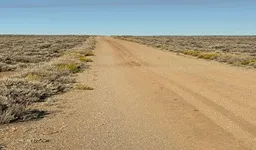 Barnes127420-01-2025
Barnes127420-01-2025 - If she thinks talent alone will put her there she will not see many podium finishes much less a GC finish.....work as a team utilizing tactics to consistently be at the top.Germanrazor10-01-2025